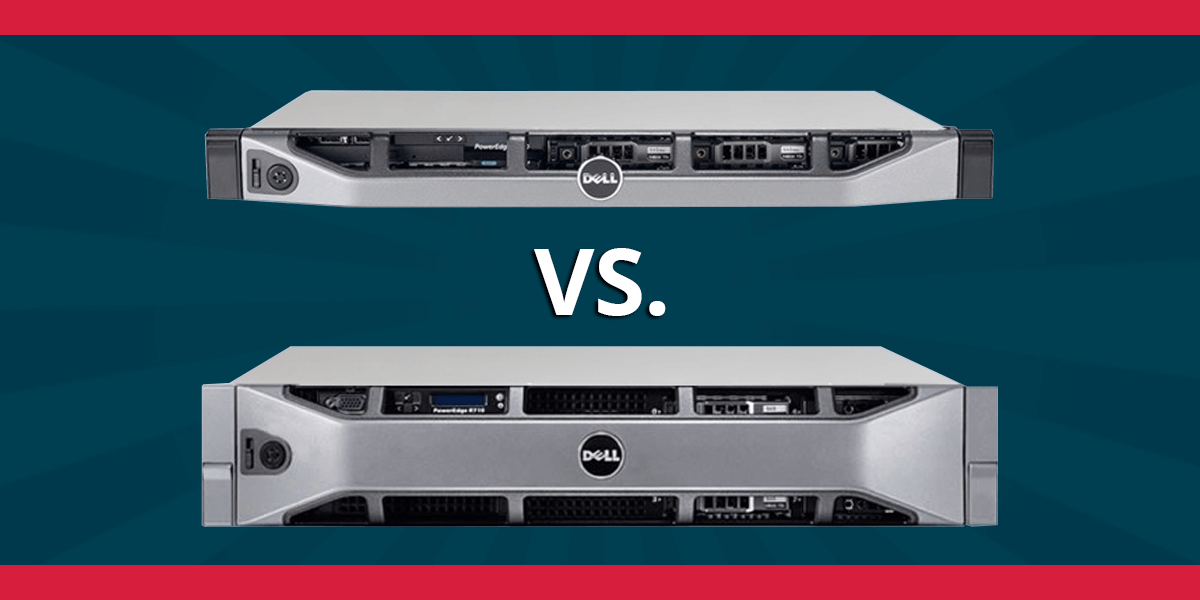The Dell PowerEdge R630 vs. R730 — Which Is Right For You?

Are you considering one of Dell’s new 13th-generation PowerEdge rack servers?
These high-performing servers include extensive memory capacity and are ideal for large virtual infrastructure and data-intensive workloads. They are available with one, two or four sockets and come in a variety of configurations to meet your performance demands.
Two of the most popular two-socket rack servers are the PowerEdge R630 and the R730. Both models provide cost-effective computing power in a modular package and are customizable with diverse storage options. They also both include Dell’s new breakthrough iDRAC8 express-level management technology for app-based smartphone and tablet server access.
What are some of the major differentiators between the Dell PowerEdge R630 and the R730? Our experts weigh in and compare.
The Dell PowerEdge R630
The Dell PowerEdge R630 is a powerful 1U configuration for small to mid-sized businesses. With about 2.5 times the performance of previous models for around the same cost, the R630 is ideal for virtualization and transactional databases.
This affordable server has 2U performance in a compact 1U chassis. Its compact design and impressive storage make it easy to leverage enterprise-level reliability and consolidate your data center operations.
When you need compact versatility for large-scale transactional and analytical processing solutions, the R630 is an exceptional choice. It offers more storage options over the previous generation of PowerEdge servers and can handle almost any workload and intensive mission-critical applications in your enterprise environment.
Memory bandwidth is as much as 15% greater than previous generations, and you can increase the number of transactions per second for online processing databases with 12Gb PowerEdge RAID controllers that double the throughput performance and cache of previous generation controllers.
The R630 features the Intel Xeon E5 2600 v3 family of processors that provide better power efficiency. The R630 supports up to two E5 2600 v3 10 core processors for a total of 72 threads for faster speed, more memory a higher computing density and lower power consumption than previous models.
Storage latency is also dramatically reduced and several storage configurations are available including SATA, SSD or SAS drive options. Administrators can choose between several PERC controllers including the S130, H330, H730P, H730 or H830 and for external storage, an optional PERC H830 controller is also available.
The R630 comes standard with Dell’s iDRAC8 express-level management technology, which offers remote management and monitoring without the need to install additional software. Administrators can maintain complete server control from any remote location using any browser from their smartphones or laptops. The iDRAC Quick Sync remote-monitoring solution connects directly to the server and enables administrators to use a mobile device to easily read and configure the server.
The R630 supports
Microsoft Windows Server, Red Hat Enterprise Linux, SUSE Linux Enterprise Server and VMware and Citrix Xen Servers.
The Dell PowerEdge R730
The Dell PowerEdge R730 features even greater expandability, computing density and storage than the R630. This server delivers outstanding functionality in demanding environments, both large and small.
When using the dual CPU configuration, a maximum of 24 DIMMS of DDR4 RAM can support 768 MB, providing a memory footprint expansive enough to power larger virtual machines for datacenters and cloud platforms.
Similar to the R630, several storage configurations are available including SATA, SSD or SAS drive options. Additional storage and SAS expanders are available to support all 16 SSD drives for a total of 29 TB of storage. The eight-bay chassis cannot be modified to accommodate 16 SSD configurations.
The R730 supports Dell’s line of PERC controllers including the H330, H730P, H830, S130 and H730. Like the R630, Dells iDRAC8 express-level management technology comes embedded in the server. With iDRAC8 enterprise, administrators can control the server from any location using a browser.
The R730 also supports Microsoft Windows Server, Red Hat Enterprise Linux, SUSE Linux Enterprise Server and VMware and Citrix Xen Servers, and additional storage is available, both direct and network-attached.
Which Is the Right Choice for You?
The PowerEdge R630 has unmatched compact versatility and is perfect for running large-scale transactional and analytical processing solutions, especially in data centers with limited rack space.
Aventis offers the R630 in two different chassis options — the eight-bay 2.5-inch hard drive or the 10-bay 2.5-inch hard drive model — and with SAS or SATA hard drive options, as well as SSD for a maximum capacity of 20 TB of internal storage.
The PowerEdge R730 2U rack mount system is an excellent building block for scalable activities including web servers, enterprise applications and fast-growing data centers. This model is ideal for IT as a service (XaaS) providers, medical imaging solutions and high-performance computing.
Both models have sockets for two Intel Xeon E5-2600 v3 product family CPUs and up to 768 GB of DDR4 memory. They can both handle large volumes of data in Oracle or other database systems, VDI and server virtualization using software such as VMware or Hyper-V, as well as low-latency website or e-commerce hosting.
Aventis offers the R730 in three different chassis options — the eight-bay 2.5-inch hard drive, the 16-bay 2.5-inch hard drive and the 8-bay 3.5-inch hard drive models.
The right server for you depends on your enterprise needs. Company SharePoint, Hadoop, Lync, Exchange and other critical services run comfortably on Dell PowerEdge R630 servers, while the R730 provides additional power to run more complex and demanding applications such as medical imaging. The R730 has the increased power and performance — including increased GPU capability — that is ideal for advanced VDI, HPC and imaging environments.
Aventis carries the Dell PowerEdge R630 and R730 models in new condition, as well as certified reconditioned models. All servers from Aventis Systems include a three-year comprehensive Essentials Warranty with the ability to upgrade to our optional Secure Drive, Extended Express and onsite services. Domestic shipping is always free.
To learn more about Dell PowerEdge rack mount servers and which model is right for your business, contact our technical experts today at 1-855-AVENTIS.